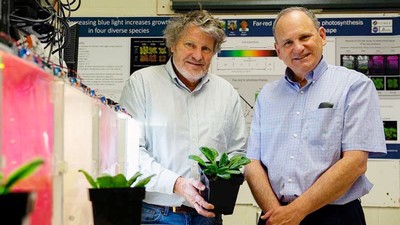Mutual Benefits: Undergrads Receive Hands-on Introduction to Research in USU Biology Lab
With National Science Foundation funding, faculty members Lauren Lucas and Zach Gompert create Research, Scholarship and Creative Inquiry-Intensive course that leads fledgling researchers, step-by-step, through the scientific inquiry process.
By Mary-Ann Muffoletto |
Video by Henry Lopez-Ortiz, Video Production Assistant, with help from Taylor Emerson, Digital Journalist, University Marketing & Communications
What does it mean to “do research”? Seasoned researchers will tell you it takes more than reading a few online articles and news items on social and popular media sites.
Research, says Utah State University biologist Lauren Lucas, begins with asking big questions.
“Among the first steps of research is practicing the scientific method, which is an empirical method for acquiring knowledge,” says Lucas, senior lecturer in USU’s Department of Biology. “Subsequent steps include identifying a research topic, developing focused research questions, learning all you can about the topic, developing a hypothesis, testing the hypothesis with experimentation, collecting and analyzing data, drawing conclusions about your hypothesis and sharing your results.”
It’s a daunting process, she admits, but not so intimidating if you approach it in increments. And that’s the intent of Lucas’ Honors Biology II Laboratory class section, BIOL 1625-001, for early undergraduates. With help from her team of graduate and undergraduate teaching assistants, the lecturer is seeing promising learning results and enthusiasm from participants in the interactive, hands-on class.
In partnership with biology colleague Zach Gompert, who received a National Science Foundation CAREER grant in 2019 to study the causes and consequences of natural selection on ecological time scales, including selections caused by interactions between mutualistic caterpillars and ants, Lucas has crafted a laboratory class that enables undergraduates to design and carry out their own experiments that tie to Gompert’s project.
“With the NSF CAREER grant, I’m testing the hypothesis that natural selection, caused by aspects of the environment, including climate and mutualistic ants, affects evolutionary dynamics and genomic diversity levels in Lycaeides butterflies” says Gompert, associate professor in biology and the USU Ecology Center. “A big part of the grant is integrating research with teaching and outreach. Students in BIOL 1625-001 are contributing by learning about the basic biology of these caterpillar-ant interactions."
Lucas notes BIOL 1625-001, now in its third year of collaborating on Gompert’s project, is USU’s first intro-level course to receive the Office of Research’s Research, Scholarship and Creative Inquiry-Intensive – RSCI – course designation.
She adds the undergrads are breaking new ground, uncovering yet-to-be-discovered knowledge.
“Zach and I had never studied the mutualistic relationship between these caterpillars and ants — nor has anyone one else in the world,” Lucas says. “And I’m not sure we would have been able to study this relationship in such depth without the participation of these Honors students.”
For the undergrads, the class provides a unique opportunity to learn about research while participating in novel basic research which, the Aggies learned, is not always glamorous. Well into weeks of reading scientific literature and developing experiments, the students left the lab to collect — often on hands and knees — live ants from USU Biology’s Greenhouse for experimentation.
“Let’s shoot for 200 total ants,” said Lucas, as the undergrads crawled underneath vegetation scouring surfaces and receptacles for the tiny insects.
Undergrad Ainslee Zumwalt said she was learning a lot in the class she hadn’t encountered before, and was looking forward to applying what she’d learned to opportunities in her bioveterinary science major in the Department of Animal, Dairy and Veterinary Sciences.
“USU is the go-to school for pre-veterinary studies,” Zumwalt said.
Back in the lab, students carefully introduced caterpillars to two species of ants and insect predators, while varying the interaction time. They then observed the interactions under microscopes, taking notes about the interactions and counting the number of interactions with handheld tally clickers.
“The ant, like, totally decapitated the predator,” said Connor Hales, a freshman plant science major from Eagle Mountain, Utah.
With their collected numbers and observations, the scholars began to interpret the data.
“I enjoyed the vivid, gory descriptions some of you wrote about the interactions,” Lucas said. “How are we feeling about data analysis? We’re going to go step-by-step through linear regression. Don’t worry — we’ll ease into this.”
Using box plots to examine the numerical data from their observations, Lucas and the students discussed their findings, and how they aligned with the hypotheses.
“Remember, there are no right or wrong answers,” Lucas said. “The data support or don’t support the hypothesis. Either way, your findings are contributing to science.”
The scholars noted some of the findings supported the hypotheses.
“It’s really interesting to see the differences in the ant species,” Hales said.
“Yes, ant species matter, and this opens the door to pursue further research about genomic changes that contribute to fluctuating mutualistic changes from year to year,” Lucas said.
Hales says she’s looking forward to upcoming research opportunities.
“I liked how this class broke things down in stages,” she says. “I definitely want to get involved in more research — something to do with plants.”
Undergraduate Honors student Haleigh Clark, a bioveterinary science major, is among scholars learning how to conduct research in Biology faculty member Lauren Lucas' RSCI-designated, introductory biology laboratory class.
WRITER
Mary-Ann Muffoletto
Public Relations Specialist
College of Science
435-797-3517
maryann.muffoletto@usu.edu
CONTACT
Lauren Lucas
Senior Lecturer
Department of Biology
435-797-9461
lauren.lucas@usu.edu
TOPICS
Education 333stories Hands-on Learning 211stories Biology 166stories STEM 164stories Teaching 152storiesComments and questions regarding this article may be directed to the contact person listed on this page.







